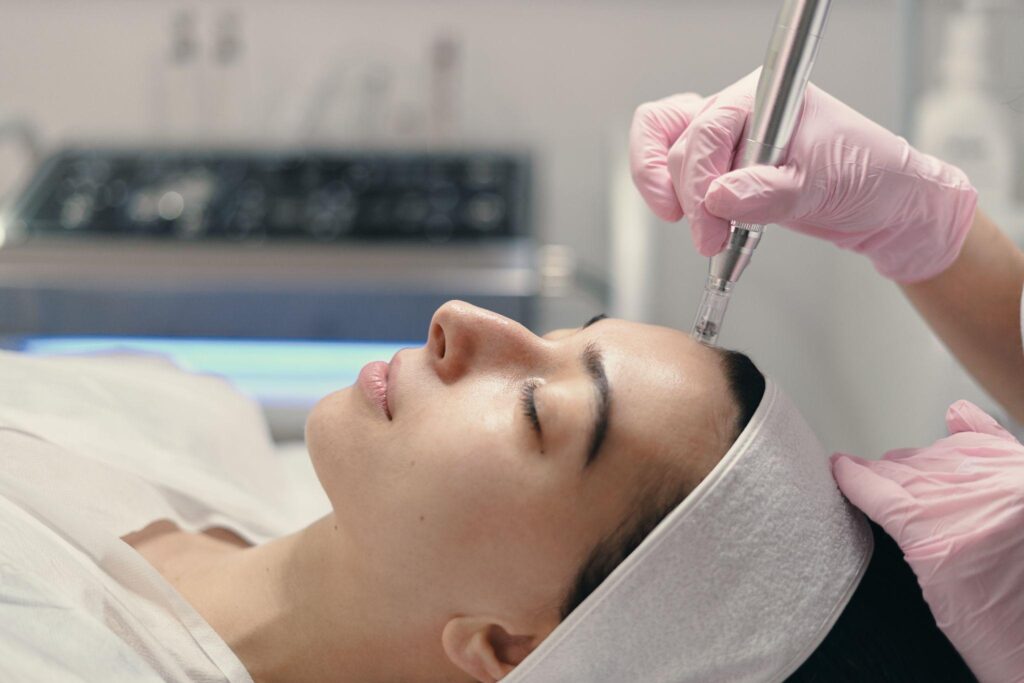
Dealing with acne can be tricky, and solving this puzzle requires time, patience, and the correct information about its type to get it under control. According to the American Academy of Dermatology, around 50 million individuals in the United States are affected by acne yearly. Crazy right?
Even if you’ve had acne for a long time, the pimples you get as an adult might be different from the ones you had as a teen. Removing them can be challenging based on factors like hormones, skin type and texture alterations, and scarring.
Though there are many ways to treat acne, it can be hard to find the best acne treatment for your skin. If you’re trying to get rid of acne, your best option is to talk to a dermatologist. A skin care professional can assess your acne and prescribe targeted treatments to clear up blemishes and prevent future breakouts effectively.
What are the symptoms of acne?
Here are the common symptoms of acne:
Whiteheads-Whiteheads are small, white spots under the skin’s surface.
Blackheads-Blackheads are small, blocked pores with a black plug.
Pimples-Pimples are inflamed, red spots that may contain yellow pus.
Nodules-Nodules are large, painful, red bumps under the skin.
One can easily identify these symptoms on the face, but acne can also affect the chest, back, and neck areas.
Severe forms of acne can result in scarring, such as when there is deep inflammation of nodules.
What causes acne?
Acne occurs when bacteria grow inside blocked skin pores. The bacteria produce substances that harm the skin, causing an accumulation of dead skin cells and bacteria. It can form pimples or nodules on the skin.
A hormone imbalance in a small chunk of individuals causes acne. Nonetheless, certain health conditions like polycystic ovarian syndrome (PCOS) may cause acne. Additionally, stress can increase hormone levels, making people more susceptible to developing acne. If anyone in your close family has had acne, then it is likely that you may develop this.
Some people correlate acne becoming worse when they eat certain kinds of food, but it is a myth that acne is not generally affected by the food you eat. If you are overweight with acne conditions, then it is likely to be severe and hard to treat.
How to treat acne?

1. Medical-grade facials and peels: They are usually available at beauty salons, but they are not strong enough to treat acne. That’s why medical-grade treatments are advised by a doctor’s clinic.
During the treatment, a secure chemical solution is applied to the skin, deeply exfoliating the skin and removing the build-up of dry, oily, and dead skin cells that can cause or worsen acne breakouts.
Chemical peels offer an effective solution as they reduce the appearance of acne. They are also effective treatments for acne scars.
2. Microdermabrasion: Microdermabrasion is a highly beneficial treatment option for improving skin clarity and reducing the likelihood of future acne breakouts. The procedure uses medical-grade crystals to remove the top layer of dead skin cells. All extracted debris is then suctioned away, leaving the skin clearer, brighter, and refreshed. The procedure boosts your lymphatic drainage, reducing the accumulation of debris on the skin and preventing blackheads and spots.
Microdermabrasion does not have any side effects, and it takes only about 20 to 30 minutes to perform.
3. Prescription medications: Medical prescriptions are an effective way to treat and control the frequency of acne breakouts and prevent scarring. Medications can significantly reduce oil regeneration and inflammation to treat bacterial infections. The prescription of the medication will be based on factors such as age and the severity of your acne.
Connect with Meta Dermatology if you are looking for a medical prescription to ensure you get the best treatment for pimples on your face.
4. Subcision: Subcision effectively breaks down scar tissue under the skin with a blunt cannula, making it a useful treatment for depressed acne scars.
A dermatologist must perform it, which requires the injection of strong local anaesthesia. For optimal results, patients typically require one to three sessions every one to two months.
5. Micro needling: Micro needling involves tiny needles to puncture the skin, and it has been found to be an effective way to treat acne.
Micro needling has become a popular choice among patients due to being a safe and minimally invasive procedure that requires little downtime. Generally, patients require four monthly treatments to achieve optimal results.
It stimulates the natural healing response to produce additional collagen and elastin, effectively minimising visible acne scarring.
Book your skin consultation today.
If your acne is severe, you may want to see a dermatologist. They can help you decide on the best treatment. Contact Dr. Singh of Meta Dermatology, a trusted dermatologist in South Jersey, to see how he can help you with your acne concerns. Schedule your appointment today.
